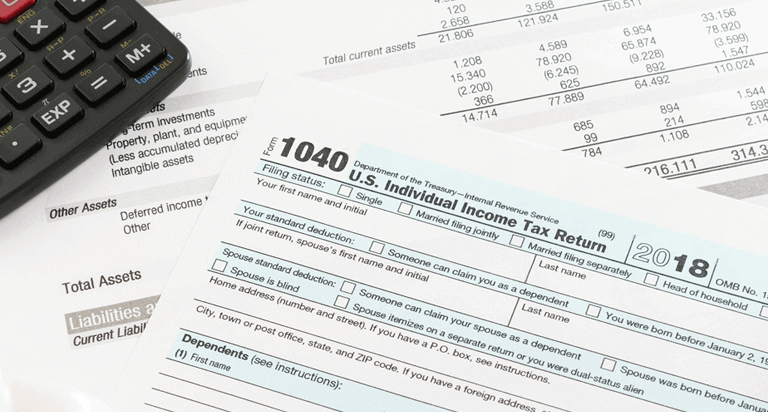Six Tax Mistakes and Penalties to Avoid
Highlights:
- Plan ahead to avoid delays in your refund and costly penalties.
- Check your essential information and math calculations to avoid IRS processing delays.
- Free tax filing services are available at irs.gov.
Filing your federal income taxes can be a complicated process, and making mistakes along the way may lead to costly penalties or delay in receiving a much-anticipated refund.
Read below for some of the most common tax mistakes and learn how to avoid making them when you file.
1. Filing past the deadline
Failure to File penalties apply if you don't file your tax return by the due date. The Internal Revenue Service (IRS) will send you a notice or letter if you owe a Failure to File Penalty. The penalty you’ll pay is a percentage of the taxes you didn't pay on time. The IRS calculates the penalty based on how late you file your tax return, and the amount of unpaid taxes as of the original payment due date.
Not filing on time can also delay any tax refund you are owed, so it pays (literally) to plan ahead and make sure you meet the filing deadline.
Remember: If you need more time to prepare your tax return, apply for an extension of time to file. Even if you get an extension to file your return, it does not extend the time you have to pay.
2. Forgetting to file quarterly estimated taxes
It’s also important to know if your type of income requires paying taxes more than once a year.
For example, if you are a freelancer or are otherwise self-employed, you don’t have an employer to automatically withhold taxes from your paycheck. As a result, the IRS requires freelancers, self-employed business owners, solo practitioners and those who get income from investments to pay quarterly estimated taxes in addition to filing an annual tax return.
To calculate your estimated quarterly taxes, fill out Form 1040-ES and mail payments to the IRS by each quarter's deadline found in the form. Or, you can pay your quarterly estimated taxes online at the Electronic Federal Tax Payment System® tax payment service.
3. Leaving out (or messing up) essential information
It’s important to dot your i’s and cross your t’s when it comes to filing taxes, which means double checking your name, address, Social Security number and other information so as not to delay the process.
If you’re getting a refund and opt for direct deposit, make sure you’ve correctly entered your bank account information on your tax form so that the money goes to the right place and you can access it as soon as it’s available.
Whether you’re filing electronically or mailing in a paper statement, be sure to include copies of any documents that are required.
Finally, don’t forget to sign your name at the end. The IRS doesn’t process unsigned returns, so you will have to provide a signed copy after the fact if you miss this important step. And be sure to put a stamp on the envelope. The U.S. Postal Service will not deliver a letter or package to the IRS without the proper amount of postage.
4. Failing to double-check your math
Aside from potentially delaying the processing of your return, improper calculations can lead you to pay an incorrect amount. If you owe more than you pay, the IRS can charge interest on any unpaid taxes.
To avoid such penalties, many filers use tax preparation software or engage a tax professional for help. There’s also help that’s available at no cost. The IRS offers a free filing program for all taxpayers.
In addition, the IRS’s Volunteer Income Tax Assistance (VITA) and Tax Counseling for the Elderly (TCE) programs offer free basic tax return preparation to qualified individuals, including persons with disabilities and limited English-speaking taxpayers. You can find a VITA/TCE location near you using this link. AARP® provides no-cost online tax return preparation assistance via its AARP Foundation Tax-Aide service.
5. Missing out on a potential tax break
When you file your taxes, make sure you know about all the deductions and other tax breaks that could be available to you. For example, if you have a child or care for another dependent, you may be able to claim the Child and Dependent Care Credit. If you’re a small business owner, you may be able to claim certain purchases as tax-deductible business expenses.
On the flip side, don’t claim credits that you’re not eligible to take. You may get a bigger tax refund at first, but it could lead to an audit that costs you more in the long run.
6. Making the wrong choice when it comes to tax deductions
It’s important to know whether it's best for you to take the standard deduction or itemize your deductions on your return, as the decision could affect how much you owe in income taxes.
Tax deductions lower your taxable income and the amount of income tax you have to pay. Many costs and contributions are deductible, including charitable gifts, mortgage interest, student loan interest and some business-related costs. Deducting these individual expenses on your tax return is known as itemizing deductions. In order to claim these deductions, you’ll need to have some kind of evidence indicating that you are eligible to have a portion of your income exempt from taxation. Itemizing your deductions may be the right choice if you had large, uninsured medical or dental expenses, paid sizable amounts in mortgage interest or property taxes, had extensive business losses or made significant contributions to certain charities.
Not everyone will itemize deductions, however. That’s because there’s also a standard deduction, which is simply a set amount of money that taxpayers can automatically subtract from their adjusted gross income. Generally, if your standard deduction is greater than the sum of the itemized deductions for which you qualify, then you just take the standard deduction instead. The size of your standard deduction depends on a few factors: your age, your income and your filing status. The standard deduction is tied to inflation, so the amounts change a bit each year.
If you’re unsure which way to go, check out the free filing resources at IRS.gov, purchase reputable tax preparation software or talk with a certified public accountant, enrolled agent or other tax preparation professional.

Sign up for a credit monitoring & ID theft protection product today!
For $19.95 per month, you can know where you stand with access to your 3-bureau credit report. Sign up for Equifax CompleteTM Premier today!



